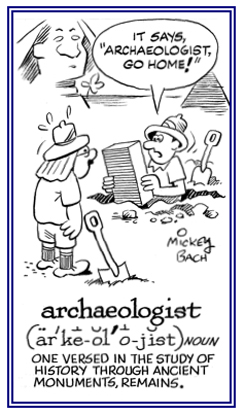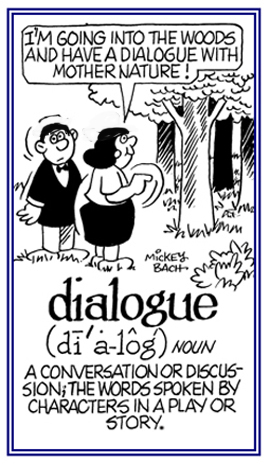logo-, log-, -logia, -logic, -logical, -logism, -logician, -logian, -logue
(Greek: talk, speak; speech; word; a person who speaks in a certain manner; someone who deals with topics or subjects)
Words that utilize -ology are in a separate unit. All -ology words can be made into -ologistic forms.
Usually the motives of archeologists are to record and to interpret ancient cultures rather than to collect and to display artifacts for a profit.

Go to this Word A Day Revisited Index
so you can see more of Mickey Bach's cartoons.
2. An interchange and discussion of ideas: In Abraham's classroom, there was a dialogue among the students and their teacher about the use of cell phones, or mobile phones, during class.
3. Etymology: "a literary work consisting of a conversation between two or more people"; from Old French dialoge, which came from Latin dialogus, from Greek dialogos, "conversation, dialogue" and is related to dialogesthai "to converse"; from dia-, "across" + legein, "to speak".
The meaning of the word expanded to "a conversation" in about 1400. The mistaken belief that it only means "conversation between two people" comes from the confusion of dia- and the similar prefix di-, "two, double, twice" that came from Greek di- and dis-, "twice" which is related to duo, "two".

Go to this Word A Day Revisited Index
so you can see more of Mickey Bach's cartoons.
![]() You may take a self-scoring quiz over some of the words in this section by just clicking on Logo Quiz to check your word knowledge.
You may take a self-scoring quiz over some of the words in this section by just clicking on Logo Quiz to check your word knowledge.
Cross references of word families related directly, or indirectly, to: "talk, speak, speech; words, language; tongue, etc.": cit-; clam-; dic-; fa-; -farious; glosso-; glotto-; lalo-; linguo-; locu-; loqu-; mythico-; -ology; ora-; -phasia; -phemia; phon-; phras-; Quotes: Language,Part 1; Quotes: Language, Part 2; Quotes: Language, Part 3; serm-; tongue; voc-.
Related "word, words" units: etym-; legi-; lexico-; locu-; onomato-; -onym; verbo-.


